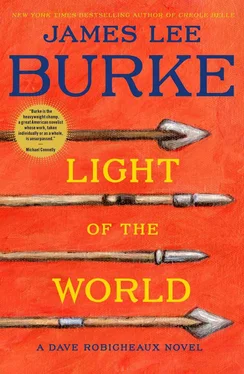“He’s a sociopath. He thinks the universe can’t go on without him.”
Clete pointed down the slope at a depression where a large animal, probably a bear, had been digging grubs. The soil was black and loamy and burrowed out from under a log. Inside the dirt and the disturbed leaves and pine needles, I could see a rusty length of chain. I worked my way down the slope and jerked on the chain until the bear trap on the other end pulled free from the ground.
“That’s the one he almost got Gretchen with?” Clete said.
I ran my thumb along the teeth on the two half-moon steel bands that had sprung tightly together. “Yeah, this is probably it.”
“You think he buried it because his prints are on it?” Clete said.
“There’s a good chance. Or he planned to come back and get it.”
Clete looked toward the north, the trees swaying overhead. A hawk was drifting on the wind stream, its feathers ruffling. “Surrette is closer to us than we think.”
“Or he was,” I replied.
“Maybe we should start knocking on some doors,” he said.
I followed him down the hill, dragging the bear trap through the thatch and detritus on the forest floor, the chain as cold and damp as a serpent in my palm.
Gretchen once read an autobiographical work titled Something About a Soldier, written by a Miami novelist named Charles Willeford. At age thirteen, in the bottom of the Depression, the author ran away from an orphanage and rode the rods all over the American West. Three years later, he enlisted in the horse cavalry and was stationed in the Philippines and at Schofield Barracks in Hawaii. In his account, Willeford talked about certain individuals for whom there were no lines. Some of them were fellow enlisted men, twenty-year-olds who looked him straight in the face and said, never blinking, “There are no lines.” They were talking about sexual intercourse with Filipino children.
The lesson Willeford took away from the experience was simple: There are always lines. No matter how bad it gets, at Normandy or in the Hürtgen Forest or at Arnhem, where he commanded a tank, there are lines. Under a black flag, inside the belly of the beast, in a man-made hell like Auschwitz, there are still lines, and the day you say otherwise is the day something flies out of your breast and does not return.
Gretchen had read Willeford’s autobiography two weeks before she popped Bix Golightly. For years she had created different scenarios in anticipation of catching up with him one day. She had convinced herself that a man who would sodomize a six-year-old girl deserved anything that happened to him.
She took the contract without fee and flew to New Orleans and followed him around the city for two days. On the third night, he crossed the bridge into Algiers and parked on a deserted side street. She could see every detail of his face as she approached his vehicle — the scar tissue in his eyebrows, the bonelike forehead, the Mongolian eyes, the crooked bridge of his nose, the flat profile from the punches he had taken at Angola and in the ring. He was smoking a perfumed cigarette and at first showed no particular interest in her presence. Then he recognized her as the contract hitter he knew only as Caruso, an almost mythic figure with obscure origins in Miami’s Little Havana. He may not have made the connection between Caruso and the little girl whose life he had ruined, but he knew that the intersection of his life with Caruso’s on this backstreet not far from the oily water of the Mississippi was not coincidence and that the last page on his calendar was about to be ripped off.
He began talking to her through the window as though they were old friends, his words spilling out nonsensically, his breath rife with funk. She never spoke. She watched him as she would a hamster racing around inside a glass box. She thought of popping him in the neck and pulling him out on the asphalt, where she would finish the job. She didn’t. There were always lines.
She squeezed off three rounds, so fast that Golightly never knew what hit him. The side of his head slapped the steering wheel, his mouth dropped open, his eyes stared at a garbage can on the opposite curb as though it were the most interesting object on earth.
Then she spat on his corpse, indifferent to the possibilities of DNA analysis, and walked away.
Now she was troubled again by Charles Willeford’s anecdotal admonition regarding lines. She had talked for forty-five minutes at the hospital with Rhonda Fayhee and had concluded that the simple and innocent girl would live with nightmares the rest of her life. Fortunately, she had been sedated so heavily by Surrette that she did not remember some of the things he probably did to her.
During the captivity, the bag had stayed on Rhonda’s head, and she never saw her surroundings. Nevertheless, she remembered details that were unmistakable: the smell of damp stone or brick, a faint glow of sunlight through a window at dawn, a sound like the chuck of waves against a boathouse or a beach.
She also thought she’d heard a plane, the motors gunning during takeoff, the sound muffled by wind blowing in trees that were thickly leafed and grew side by side. There was another detail, one that seemed out of context, surreal, one that a drowning person might remember if he had been sucked into a whirlpool while people chatted on dry land a few feet away. Rhonda was sure she heard people singing while she was being loaded into a vehicle. The words she heard just before the door slammed shut were “Life is like a mountain railroad, with an engineer that’s brave.”
Later, Gretchen Googled the lyrics and discovered they were part of a hymn often sung in southern churches.
Where was Rhonda Fayhee held prisoner? In all probability, it was the same place Felicity Louviere was being held now.
“Rhonda, do you think there was an airstrip close by? Did you hear planes coming in overhead?” Gretchen asked.
The girl said the sound of the plane had been down below somewhere.
“Below the level of the basement?” Gretchen asked.
“Yes,” the girl replied. “It droned a long time before it took off. It sounded like it was turning. It made a fluttering sound.”
The details about the place of captivity did not fit together.
For Gretchen, the answer to the riddle probably lay with Caspian Younger, a man whose whole life had been one of entitlement, a man who may have been complicit in the murder of his adopted daughter. Should lines be an issue? Should a man like Caspian Younger be protected from accountability while his wife was tortured to death? What a stupid question to ask, Gretchen thought.
She drove to the Younger compound, expecting to be confronted with security personnel who would do everything in their power to turn her away. That’s what should have happened. Instead, she would learn that the Younger family drama was not the stuff of Macbeth or Oedipus Rex or King Arthur and Mordred or the horns blowing along the road to Roncevaux. Rather, it was the same material to be found in soap opera, as sordid and saccharine and petty as the behavior of the players in any work of pathos. The portrayal of the patrician protagonist and his tragic descent from grace made for lovely entertainment, but it seldom had anything to do with reality.
Gretchen parked her truck in front of the Younger compound and walked down the flagstones to the front door. The only vehicle she could see was a faded compact parked by the carriage house. It had dents in one fender and silver duct tape wrapped around a broken side mirror. The yard was empty, the heavy oak door ajar. She could hear voices inside and a sound like someone diving off a springboard into a swimming pool. With the tips of her fingers, she eased the door wider and walked through the foyer into the living room. Down a hallway, she could see Caspian Younger in swim trunks and a bathrobe, standing by French doors that gave onto a patio. He was pouring from a bottle of Cold Duck into a wineglass. He was unshaved and his robe was open, the mat of hair on his bony chest glistening with water. In the background, a girl not over nineteen climbed out of the pool, her bikini clinging to her body with little more density than wet Kleenex. Jack Boyd put his cigar in an ashtray on top of a glass table and handed her a towel.
Читать дальше












